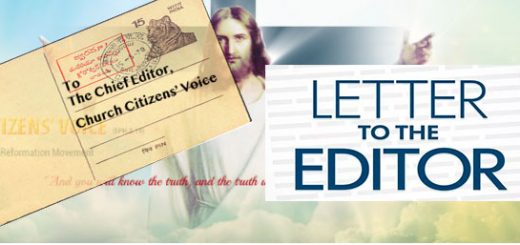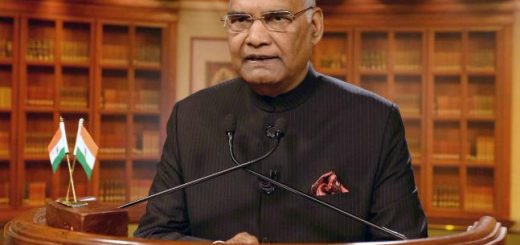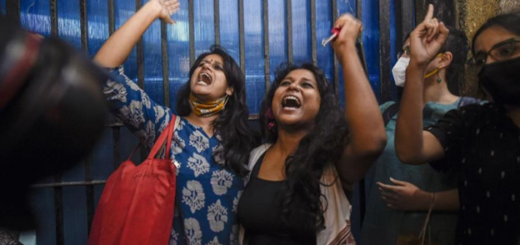Democratic Dissent: Is there space for it anymore in India?

LA CROIX INTERNATIONAL
October 20, 2017
Fr Myron Pereira SJ, Mumbai
India
Cover image: The Parthenon, Athens, home of ancient Greek democracy / Steve Swayne / Wikipedia / CC BY 2.0
 Here is a probing and very relevant article by Father Myron Pereira SJ who is a media consultant based in Mumbai. While making a comparison between Church governance and democratic practice, he feels that inherent in democratic practice is the principle of freedom – freedom of thought and expression, particularly. Different people tend to think differently, but all must be allowed their say, and negotiation and compromise must ensure that no particular opinion feels left out. Isaac Gomes, Asso. Editor, Church Citizens' Voice.
Here is a probing and very relevant article by Father Myron Pereira SJ who is a media consultant based in Mumbai. While making a comparison between Church governance and democratic practice, he feels that inherent in democratic practice is the principle of freedom – freedom of thought and expression, particularly. Different people tend to think differently, but all must be allowed their say, and negotiation and compromise must ensure that no particular opinion feels left out. Isaac Gomes, Asso. Editor, Church Citizens' Voice.
In modern times, democracy is considered as a given in government, which means that people – all kinds of people – want to have their say in how they are ruled. However, only a little reflection will tell us that this was not always so.
Within European history, the Reformation may be considered a watershed in this regard. When in the 16th century, Martin Luther challenged the hegemony of the pope in choosing how to believe, he started a precedent of dissent which rapidly snowballed into a secessionist movement in Christian Europe.
Not for nothing were the secessionists called Protestants because they "protested" against the traditional discipline of the Church. Their opponents retained the name Catholic or universal, for they claimed universality of belief and action.
More derisively, they were called Papists because they gave unquestioning obedience to the pope in Rome. Today's Roman Catholics are firmly within this tradition of obedience to legitimate authority.
Ah, but there's the rub: where does legitimate authority come from?
The question has a distinctively modern ring. For modern times are times of revolution when groups of people within different countries effectively deposed their rulers and placed others in their stead.
These revolutions might have been bloody – like the French (1789) or the Bolshevik (1917); or they may have been largely peaceful, like India's Independence Movement (1947). But all of them replaced feudal or colonial governments with representatives of the people, even though these elected representatives often squabbled among themselves, and were later replaced with iron dictatorships.
Democratic governments, it must never be forgotten, always rule in tension. In these matters, some countries succeed better than others.
Because of its long tradition of autocracy and obedience, the Catholic Church has generally frowned on democracy, and frequently clashed with elected secular governments. It is hard for an institution which believes that only its hierarchy has the divine right to rule to accept the governance of clerks, farmers, and traders – which is what democratic parliaments largely consist of.
 Inherent in democratic practice is the principle of freedom – freedom of thought and expression, particularly. Different people tend to think differently, but all must be allowed their say, and negotiation and compromise must ensure that no particular opinion feels left out.
Inherent in democratic practice is the principle of freedom – freedom of thought and expression, particularly. Different people tend to think differently, but all must be allowed their say, and negotiation and compromise must ensure that no particular opinion feels left out.
This is not something that Church governance feels comfortable with, as the previous Popes, John Paul II and Benedict XVI proved all too clearly. During their time, dissenting theologians were silenced and the collegial exercises encouraged by Vatican II were manipulated and blocked.
Bishops and clergy quickly realized that their chances for advancement were linked to their toeing the Roman line. So it comes as an astonishment to many that the present Pope Francis emphatically encourages diversity of opinion and practice within the Catholic community.
He does not do this out of mischievous intent, but because he realizes that the teaching authority (magisterium) of the hierarchy must ever be complemented by the ability to listen to what the ordinary faithful say (sensus fidelium).
As people often say many contradictory things, so Pope Francis (as Pope Paul VI before him) proposes the practice of dialogue – of listening "to what the Spirit is saying through the churches." Put in other words, a doctrine mustn't only be proclaimed from above, but it must also be received from below. It is this which contributes to the vibrancy and maturity of faith.
But does this allow for voices of dissent? Not necessarily, but it does encourage questioning, disagreement, and plurality of opinions. However, dissent is not something that governments of any kind, whether religious or secular, are comfortable with.
Most governments want obedience, not questioning. Nay, most governments want obeisance and servility. No government, whether secular or religious wants to be held to account. This is why most governments practise a divide and rule policy – favouring one faction against the other, one caste against the other so that there is no concerted opposition to what they do.
And where bribery and partisanship fail, there is always intimidation and the threat of punishment, or death. Have we reached such a point in India today?
From being a poor third-world country, which nevertheless prided itself on its free press and its culture of independent thinking, India preens and postures itself today as an Asian super-power in the making, where uniformity of thought and action is mandated for everyone, at every time, and in everything.
Everyone must stand and acclaim the great leader, under pain of being considered "anti-national".
It must be obvious to the reader that we are talking about a different kind of nation. Our Constitution envisaged a "democratic, secular, socialist and sovereign nation" but the majoritarian ethos which dominates our speech and behaviour today has another "nation" in mind.
Whatever form that takes, one thing is sure, it will not be democratic.
In a recent book entitled, The Argumentative Indian, Amartya Sen argued that Indians have always tended to discuss and argue, to prize rational inquiry over dull conformity. In other words, he says, the tradition of dissent has a long and honourable tradition in this land.

Will we value the right to inquire, to challenge and to dissent, as part of our democratic legacy – or will we allow it to lapse by default? This is the most important issue of the present time.
(The article has been reproduced courtesy La Croix International. Photos have been additionally inserted by CCV to add effect).

















Varghese Pamplanil wrote:
The article of Myron Pereira S J on freedom of expression, dissent and dissidents is thought provoking.
It is believed that with the growth of population and the resultant scarcity of food, which was almost freely available to the hunter- gatherers in the nature around, they were made to abandon their Paradise in the Eden and switch over to cultivation of crops and domestication of animals. The first agricultural communities were believed to have emerged in the fertile delta of Euphrates and Tigris around twelve thousand millennium ago. Instead of the hand to mouth existence, the new way of life made available surplus food.
Unlike the hunter-gatherer groups with a few members, the new communities were comparatively larger and lived in city states. The changed situation called for new codes of conduct for ensuring equilibrium in the community. Protection from external aggression was provided by persons adept in military strategies and capable of fighting. In this social matrix, shamans cum magicians claiming access to the supernatural powers and abilities to influence the forces of nature assumed positions of leadership. It was the duty of the proletariat to provide food and other creature comforts to the priestly/ ruling class.
In the new set up, the leisure class had time on their hands for metaphysical speculation. The myths that evolved in Sumer became articles of faith in Judaism and Christianity. Any one who questioned these postulates were branded trouble maker, dissident and heretic and punished. The “Big Brother”, who can never err took over. The rules set out by him were to be obeyed implicitly and his diktats got solidified and frozen in time, never to be questioned. The ruler, whether that of a state or a religion once he occupy position of power strive to perpetuate it by suppressing alternatives. Autocratic tendencies emerge smothering new ideas and ideals. Dissent and protest are put down with all means available. In this age of Internet and instant spread of information and propaganda, views not in conformity with the extant dispensation can be pulverised by innuendo, double speak, misinformation, blatant lies, suppression opposite views, inducements, airing of paid fake news, withholding of government funds for advertisements in tandem with threats and callous cynical manipulations
To my knowledge, the earliest dissenter who had to pay the ultimate price of forfeiting his life for steadfastly holding to his views was Socrates. He could be physically eliminated, but his ides lived on through Plato.
The most poignant is the tragic fate of Giordano Bruno (1548-1600) who was burnt alive at the stake in Rome by the Catholic Church for heresy for questioning the rigid Aristotelian and Scholastic principles. What caused the ire of the Church, more than any thing else, was his protest against the moral and social corruption of the day. His assertion of the realty of the heliocentric theory and suggestion that the universe is infinite comprising of innumerable worlds substantially similar to those of the solar system was contrary to the position taken by the Catholic Church. His view that the Bible should be followed for its moral teachings and not for its astronomical implications was taken umbrage. The traditional Aristotelian physics was reduced by him to a monistic conception of the world implying the basic unity of all substances. On the infinite universe and worlds, he developed a cosmological theory by postulating that the universe was based on “form” and “matter“ and an intimately united and constitute “one“, basic unity of all substances and the coincidence of opposites in the infinite unity of the “Being.” He subscribed to Averroistic view of the relationship between philosophy and religion according to which religion is considered as the means to instruct and govern ignorant people; philosophy as the discipline of the elect who are able to behave themselves and govern others judiciously. He ridiculed contemporary superstitions and vices and questioned several Catholic doctrines including eternal damnation, the Trinity, the divinity of Christ, the Virginity of Mary and transubstantiation. He abandoned totally the idea of a hierarchical universe and maintained that the universe is infinite. His fault was having an analytical brain and being ahead his times.
Clement VIII who condemned, Bruno, without compunction, to be burned alive as an impenitent heretic ended up being a insignificant foot note in history or a notorious inhuman fiend while Bruno is a beacon to the modern mind. Bruno’s theories influenced 17th century scientific and philosophical thoughts. Since the 18th century his ideas have been absorbed by many modern philosophers. As a symbol of freedom of thought, Bruno influenced European liberal movements of the 19th century. His ethical ideas appeal to en-lightened humanistic activism.
The conclusion that may emerge is that entrenched interests with their hidden agendas, may succeed in the short run, but the urge to change inherent in human will prevail So one should not be afraid of being a questioning dissident. It is ideas that guide humanity in the stair of progress.
Varghese Pamplanil, From Austin TX.
(N.B. For factual information indebted to Encyclopaedia Britannica, Wikipedia and other sources.)